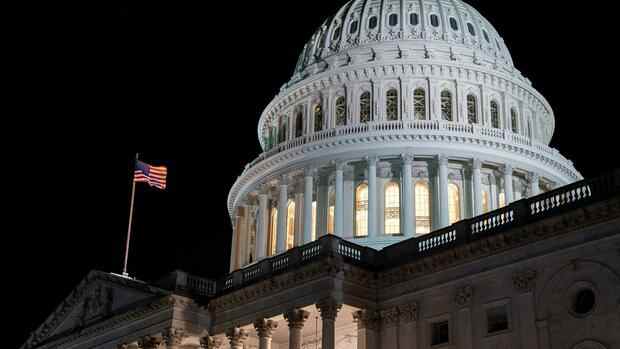The US Senate voted with a clear majority.
(Photo: Bloomberg)
Washington Shortly before the deadline expired, the US Congress averted the threat of a partial standstill in government business. Both chambers voted on Thursday (local time) for a transitional budget until December 3. The new fiscal year in the US starts this Friday. If Congress had not adopted a budgetary regulation by then, parts of the state apparatus would have been “shut down”.
US President Joe Biden has yet to sign the law. The problem of an impending payment default by the US is not yet resolved – and disputes within the Democrats are also causing difficulties for Biden. Although some Republicans voted for the budget in both the Senate and the House of Representatives, a large number of them voted against it in both chambers.
By preventing the “shutdown”, only one crisis has been averted for the time being. The much larger problem of the debt ceiling remains for the time being. Without an increase or suspension of this limit by Congress, the US government could default on payments in mid-October, according to Treasury Secretary Janet Yellen.
Last week, the House of Representatives approved a regulation for the temporary funding of the government with the votes of the Democrats. In the Senate, however, the Republicans resisted because it also provided for the debt ceiling to be suspended for the time being – which they reject. In the end, the Democrats were forced to separate the two questions in order to avert a “shutdown” and get the budget law through in the Senate.
Top jobs of the day
Find the best jobs now and
be notified by email.
With the help of a special procedure (“reconciliation”), the Democrats could bring the Senate to raise the debt limit – but they are blocking this. The chairman of the House of Representatives, Nancy Pelosi, had described this procedure as too “risky”.
Finance Minister Yellen had warned of a disaster in the event of a default. Confidence in the country’s creditworthiness would be damaged – a financial crisis and recession looming, she said.
Biden tries to get two central projects through
In addition to the fighting between the two parties, intense internal disputes among the Democrats are also making President Biden difficult. With a series of talks and negotiations, he is trying to push through two central projects of his term in office in Congress: a large-scale package for investments in the country’s infrastructure and a second huge package for social investments.
The infrastructure package, with which roads, bridges and other transport and energy networks in the USA are to be modernized, passed the Senate in August after long negotiations – with the support of Republicans. The final vote of the other Congress Chamber is still missing. Around 550 billion US dollars of new investments in infrastructure are planned over the next few years. In total, including previously budgeted funds, the package is worth more than a trillion dollars.
The second package provides for a significant expansion of social benefits. For example, Biden wants to invest more in education and childcare, give families more support and tax relief, and take money into the fight against the climate crisis. So far, this package is worth $ 3.5 trillion, also spread over several years. It is to be financed through tax increases for top earners and the more consistent collection of due taxes.
Since the Republicans do not want to go along with this, the Democrats are planning to bring this second package of the special parliamentary procedure through Congress on their own. However, they only have narrow majorities in both chambers, and their plans are also controversial. Some moderate Democrats are critical of the high spending and oppose it. Progressive Democrats, on the other hand, wanted more. The latter threatened to block the infrastructure package unless the larger second package was also secured.
More: Trillions for the political turnaround? Joe Biden faces his first major defeat
